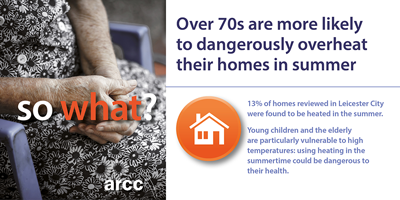Researchers at Loughborough University have found that the over-70s are more likely to heat their homes during the summer. Older people are particularly vulnerable to high temperatures, so summertime heating can be dangerous to their health.
Indoor temperatures were measured in the living room and bedroom of over 250 homes in Leicester City, UK, during the mild summer of 2009. The results show that 13% of the homes were heated during those summer months, with occupants over 70 years more likely to use indoor heating. Internally heated homes are less able to absorb the heat from a heatwave, leading to even higher internal temperatures. The elderly are more susceptible to the impacts of extreme temperatures as thermal sensation lessens with age.
Two methods to assess the overheating risk in homes that did not use mechanical cooling or heating showed which were the most vulnerable to overheating. Despite the cool summer, 15% of bedrooms were at a temperature that would inhibit sleep for more than 30% of occupied time. Flats were more likely to overheat, while older solid-wall homes were cooler.
Relevance
The average annual temperature in the UK has increased by about 1°C over the last century. The continued rise of CO2 levels suggests that this trend will carry on as the climate changes in response.
Higher average temperatures increase the frequency and magnitude of heatwave incidents. This has been felt in the UK over the last decade. The heatwave of August 2003 resulted in over 2000 (16%) excess deaths in England and Wales. People living in large cities and the elderly were disproportionally effected.
Measuring indoor temperatures in dwellings enables researchers to assess how summertime temperatures relate to thermal comfort and overheating risk. It also allows identification of those most at risk of dangerous overheating.
Temperature data was collected in over 250 homes in Leicester City, UK. The main findings were:
- The warmest of these homes were amongst the 13% that were identified as being heated during the summer.
- Occupants older than 70 years were more likely to heat their homes in the summer.
- Despite the cool weather, 15% of bedrooms were of a temperature that would inhibit sleep.
- Flats were warmer than other house types, while detached and mid-terrace properties were cooler.
Now what?
The overheating observed during a mild summer suggests that a significant proportion of UK homes are at risk of overheating during a sustained heatwave. Newer dwellings and flats are particularly at risk of elevated indoor temperatures, and should be adapted to avert the risk of overheating. New buildings should be designed with reducing overheating risk in mind.
Older occupants are particularly at risk, and this group was found to be more likely to heat their homes during the summer. The NHS heatwave plan should therefore include explicit advice that heating systems and other sources of heat should be turned off during warm weather.
Relevance
As heatwave events become more common and severe, we need to plan to reduce overheating in homes. More and more homes are insulated to higher standards to reduce heat loss and the cost of winter heating. However, this research and other work in this area show that better insulated homes are more likely to overheat in the summer.
Developers and social housing providers
It is suggested that when energy efficiency improvements are made to homes, the potential overheating risk is taken into account by adding solar shading.
Public health professionals, landlords and local authorities
Young children and the elderly are at the highest risk of summertime overheating. Better information is needed for these groups and those caring for them to reduce the dangers of overheating.
Residents
To reduce overheating during a heatwave:
- Close curtains or blinds during the day.
- If the external temperature is lower than inside your home, open windows to circulate air.
- Make sure the heating is turned off.
- Drink plenty of water.
Researchers and technical experts
More work is required so we can better predict which homes are at the greatest risk of overheating.


